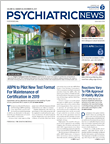Selective serotonin reuptake inhibitors (SSRIs) and serotonin-norepinephrine reuptake inhibitors (SNRIs) may raise the risk for developing type 2 diabetes among youth, new research finds.
The data come from a cohort study of more than 100,000 Medicaid-insured youth aged 5 to 20 years who initiated antidepressant treatment. The risk for developing type 2 diabetes was nearly doubled among current compared with former SSRI/SNRI users, and the risk intensified with increasing duration of use, average daily dose, and cumulative dose.
The overall risk was still small—1.29 versus 0.64 per 10,000 person-months, but the difference was statistically significant.
“When you look at absolute risk, it’s low, … but it’s particularly apparent with long-term use and in high doses,” said lead author Mehmet Burcu, Ph.D. He conducted the study while he was studying pharmacoepidemiology in the Department of Pharmaceutical Health Services Research of the University of Maryland, Baltimore. The study was posted October 16 in JAMA Pediatrics.
Burcu told Psychiatric News that the risk for type 2 diabetes is probably negligible among youth prescribed the antidepressants in appropriate doses for a limited time. However, he added, “if a child needs the medication for long term in high doses, I think monitoring needs to be in place.”
David Fassler, M.D., a child and adolescent psychiatrist at the Larner College of Medicine at the University of Vermont, told Psychiatric News, “The results of the study underscore the importance of weighing the relative risks and benefits of all interventions, including antidepressants, in the case of children and adolescents. Hopefully, the findings will help parents and physicians make more fully informed decisions about treatment options.”
In addition, the authors wrote, “given that more than half of antidepressant prescriptions to U.S. youth occur in outpatient visits to pediatricians and other primary care physicians, the study findings provide an impetus for policy development to improve monitoring for the benefits versus risks of antidepressant use in pediatric care models, specifically for SSRIs, the most commonly used antidepressant subclass.”
Burcu and colleagues examined data from Medicaid administrative claims in California, Florida, Illinois, and New Jersey for 119,608 youth who had initiated treatment with any antidepressant from 2005 to 2009 and who had made at least two outpatient health care visits in the prior year. “Current” use was defined as having not been discontinued in the past 90 days.
Almost 70 percent of the subjects were aged 10 to 17, 53.7 percent were nonwhite, and 67.9 percent were lowincome. Gender distribution was about equal. During an average follow-up of 22.8 months, SSRIs and SNRIs were prescribed to two-thirds of the subjects (66.3 percent). Just 37.4 percent of the entire group had a diagnosis of any depressive disorder.
Overall during follow-up, 233 youth were diagnosed with type 2 diabetes, including 156 during current use and 77 during former use, with incidence rates of 1.16 and 0.56, respectively, per 10,000 person-years.
When examined by type of antidepressant, the increase in type 2 diabetes risk for current versus former users was significant for SSRIs/SNRIs (1.29 versus 0.64 per 10,000 person-years, relative risk 1.88) and for tricyclics (0.89 versus 0.48 per 10,000 person-years, relative risk 2.15), but not for any other antidepressant class (relative risk 0.99).
For youth currently using SSRIs/SNRIs, the type 2 diabetes risk was more than doubled for those using the medications for more than 210 days (relative risk 2.66) and for 151 to 210 days (relative risk 2.56) compared with 1 to 90 days of use. No similar relationship was seen with other antidepressants.
The mechanism isn’t clear, but evidence from adult studies finding a similar relationship have suggested that long-term use of antidepressants that have an affinity for serotonin receptors may promote weight gain. Other proposed mechanisms include disturbances in glucose homeostasis, decreased pancreatic insulin secretion, and increased cellular insulin resistance. ■
“Association of Antidepressant Medications With Incident Type 2 Diabetes Among Medicaid-Insured Youths” can be accessed
here.
